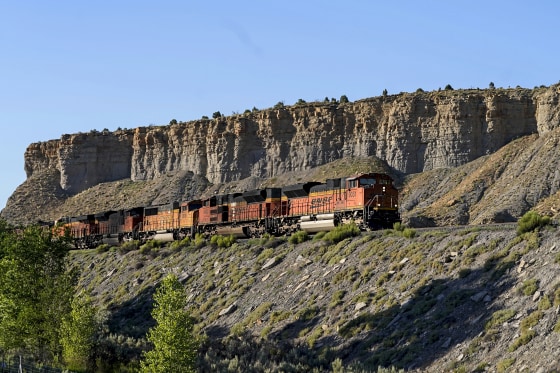
WashingtonIn a debate over whether federal officials carried out a thorough enough environmental analysis before allowing an 88-mile railroad project that would transport crude oil in Utah, the Supreme Court on Tuesday considered the project’s future.
It seemed likely that a majority of justices would find the federal government’s analysis adequate based on the two-hour oral argument.
However, in order to expedite the licensing process for large infrastructure projects, the court could refrain from issuing a more expansive pro-business finding that would impose new restrictions on the scope of such assessments.
The Seven County Infrastructure Coalition, a coalition of local counties, has proposed a railroad that would connect northern Utah to the national rail network, facilitating the transportation of oil from the Uinta Basin.
Environmental organizations and Eagle County, Colorado, which says it will be negatively impacted by the railroad’s downstream consequences, are against construction.
After conducting an environmental evaluation, the Surface Transportation Board (STB), the federal body responsible for project approval, approved the project to move forward.
However, in a 2023 decision, the U.S. Court of Appeals for the District of Columbia Circuit ruled that the analysis and other aspects of the approval process were flawed and returned it to the government for additional consideration.
At the Supreme Court, the main topic of discussion was whether or not agencies must take into account indirect effects that are nonetheless predictable. Regarding the railroad, this includes the impact the project will have on the oil refineries that will eventually receive the cargo, which are located as far away as Louisiana and Texas.
According to the appeals court, the board did not sufficiently take into account those wider environmental effects as mandated by the National Environmental Policy Act (NEPA), a federal law.
However, justices of the Supreme Court with different ideologies did not seem to share this opinion.
Sonia Sotomayor, a liberal justice, was one of several who stated that the STB’s job is to concentrate on the railroad’s environmental effects rather than the refineries.
“It isn’t the carrying [of the oil] that causes the pollution, it’s the refining,” she stated.
The project’s opponents’ demands, according to fellow liberal Justice Elena Kagan, “seem to go beyond” what NEPA mandates.
Similar opinions were voiced by conservative judges, such as Justice Brett Kavanaugh, who stated that federal agencies should have considerable latitude in determining what they wish to include in their environmental assessments throughout the NEPA review process.
However, Paul Clement, the coalition’s attorney, faced some opposition when he requested that the justices adopt a new legal standard that would impose more limitations on the environmental concerns that agencies may take into account.
Without using such a standard, the court could make a decision in favor of the agency.
The coalition filed an appeal with the Supreme Court, arguing that NEPA does not mandate that a wide range of “imponderables” be taken into account that go well beyond the project’s actual location.
The coalition’s attorneys stated in court documents that the agency would be required to take into account the possible effects of additional crude oil refining on areas as far away as Louisiana and Texas under the appeals court’s ruling.
NEPA assessment only compels the agencies to consider “reasonably foreseeable” environmental implications, according to legislation intended to streamline the process that was passed by Congress last year and signed into law by President Joe Biden.
At the Supreme Court, the Biden administration has supported the coalition’s claim that the STB’s review was enough.
According to court documents filed by the county’s attorneys, Eagle County will be directly impacted because nine out of ten trains using the new railroad will eventually travel through it via an existing route that runs along the Colorado River.
The challengers also noted that even if the coalition prevails on the NEPA issue, the appeals court criticized other aspects of the STB’s decision, which means that additional scrutiny is still required before the project can proceed.
A public-private partnership including the counties and two businesses—the railroad operator Rio Grande Pacific Corp. and the infrastructure contractor DHIP Group—is building the railroad.
Citing the court’s ethics standards, Justice Neil Gorsuch stepped away last week and will not be involved in the case. Over a dozen members of Congress and liberal organizations had called on him to step down due to his prior ties to billionaire Philip Anschutz. Anschutz Exploration Corp., one of Anschutz’s businesses that engages in oil and gas drilling, submitted a brief supporting the coalition in the lawsuit.
Note: Every piece of content is rigorously reviewed by our team of experienced writers and editors to ensure its accuracy. Our writers use credible sources and adhere to strict fact-checking protocols to verify all claims and data before publication. If an error is identified, we promptly correct it and strive for transparency in all updates, feel free to reach out to us via email. We appreciate your trust and support!
